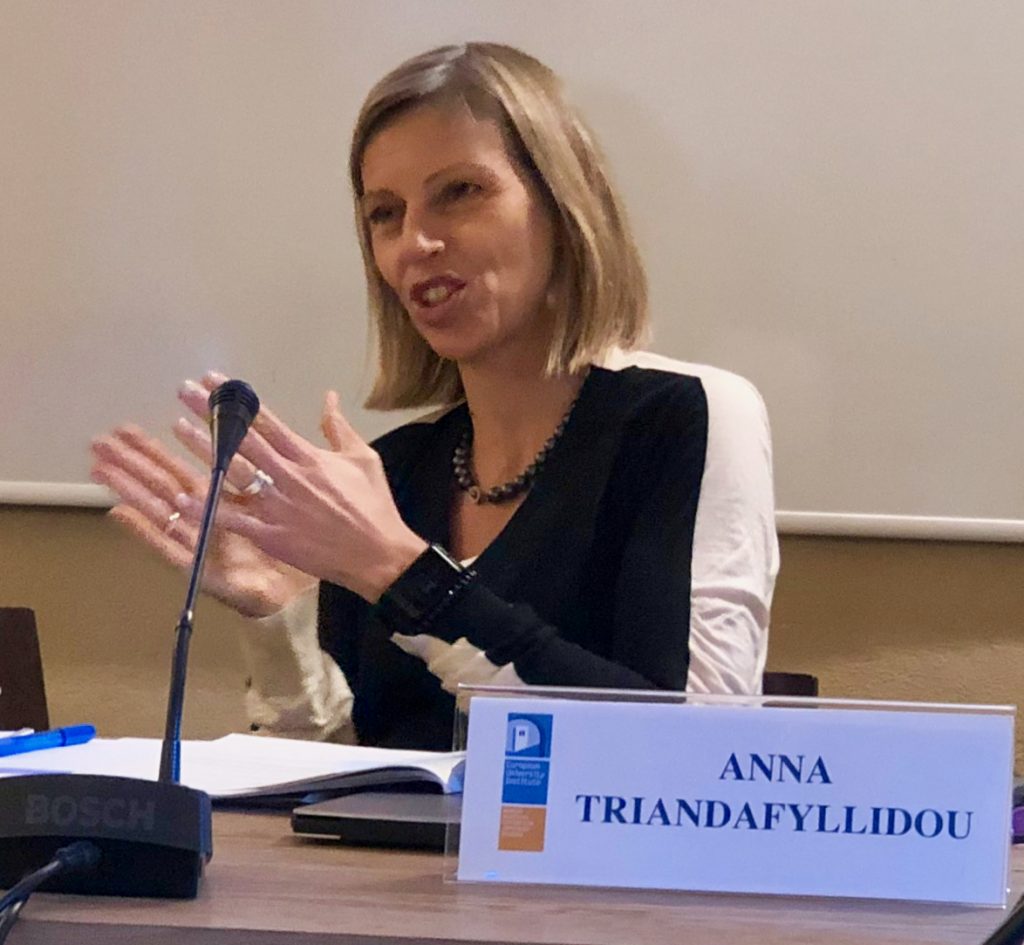Florence – March 12, 2019

How did GREASE get started?
The GREASE project developed out of a shared interest among academics and policymakers in the central question: How can societies accommodate religious diversity and prevent radicalisation? That interest, of course, reflects growing awareness of ethno-religious heterogeneity as a consequence of migration. People in Europe and Asia are increasingly reflecting on the place of religion in public life and wondering how religious diversity can be successfully governed.
European countries seem to have exhausted their ideas and policies about how to best govern and accommodate religious diversity. Faced with Islamic terrorists and returning foreign fighters, many governments (and even scholars) are at a loss. We are compelled to ask ourselves: What went wrong? Why are young people using and abusing religion to justify violent extremism?
In my own search for answers, I began to look beyond Europe. In the spring of 2015 I teamed up with my colleague Tariq Modood to organize a conference around these questions. We explicitly sought to engage with non-European scholars, paying special attention to different approaches and experiences from Asia. Indeed, it is in Asia that we find both the world’s largest functional democracy, India, and the world’s most populous Muslim majority country, Indonesia. So this is how we got started on the path that would lead to the GREASE project.
The relevant call of the EU’s Horizon 2020 research programme provided us with an opportunity to apply for funding and turn our ideas into reality, engaging with mostly non-European academic partners. The resulting GREASE project offers not only a wonderful opportunity for thinking together and exchanging ideas; it is a real science diplomacy laboratory for all of us.
What are the project’s main aims?
The project has two main goals: First, we aim to better understand how religion and religious diversity are governed in different world regions. We pay special attention to the less-studied regions of Europe, notably Southeastern and Eastern European countries including Russia, a “religion giant” just waking up. We also look at the different experiences and policies in the wider MENA region and Turkey, South Asia, Southeast Asia and in Australia. Our aim is to learn from each other and ultimately to test our hypothesis that maybe secularism has run its course and we need to come up with new models and concepts.
Our second goal is to analyse how these countries with such different socio-economic and political contexts – countries with Muslim majorities or with pronounced religious minority groups – address religiously inspired violent radicalization. The underlying idea is that maybe their ways of governing religion and religious diversity actually prevent such radicalization. That idea, of course, is too simplistic. What we are really looking at is the role that religious/theological, socio-economic and individual cultural factors play in making people and communities vulnerableto religiously inspired violent radicalization, on the one hand, or indeed contribute to building resilienceand help particularly young people find different channels to express grievances and develop a sense of belonging, without resorting to violent extremism, on the other.
What do you think Europe can learn from Asia’s experience in governing religious diversity and preventing religiously motivated radicalisation?
This is precisely the challenge of our project: it is an exercise of humility and openness on all sides. In Europe there is a widespread notion that we have nothing to learn from non-Western cultures and values. We would like to prove them wrong and invite all of us to critically engage with one another.
Who do you expect to benefit from the work being done in GREASE? What kind of impact are you hoping to achieve?
Our impact will be on three levels, involving science, policy, and diplomacy.
On the scientific level we hope to come up with solid knowledge on over 20 countries around the world on how they govern religion and religious diversity and address radicalization, confronting and assessing their principles, laws and practices. We shall offer comparative analysis and, hopefully, new concepts for the governance of religious diversity today.
With respect to policy, we shall offer knowledge and advice to the different countries involved (in Europe and elsewhere) as well as EU policymakers on what can be improved in the ways we deal with religion in the public space and religious diversity in our laws, institutions and practices. Our aim here is to systematize scientific knowledge and ‘translate’ it into straightforward terms (e.g. in the form of policy briefs) that policymakers can appreciate. We will also engage policymakers and other stakeholders like religious leaders and civil society actors, encouraging them to think outside the box about the place of religious diversity in society and about the best ways to prevent violent radicalization.
Finally, on the diplomacy level we hope to have a lasting impact by demonstrating how EU projects can foster sustained cooperation with non-European university and research centres in the social sciences. This is not just about integrating foreign experts into EU research projects. It’s about engaging with whole research teams, organizing workshops and co-authoring papers with social scientists from outside Europe. It is also about undoing global hierarchies of cultural and knowledge production – hierarchies constructed around flawed notions about the ‘West’ and ‘the rest’. Of course GREASE won’t change the world. But we do believe it can open up new pathways for science and cultural diplomacy.
